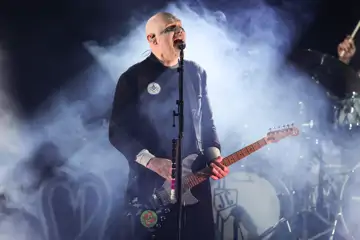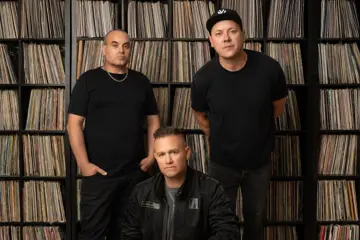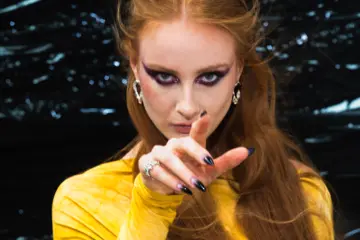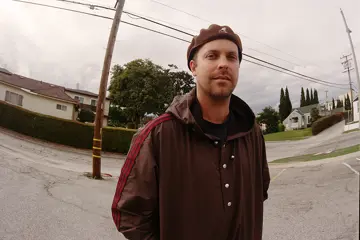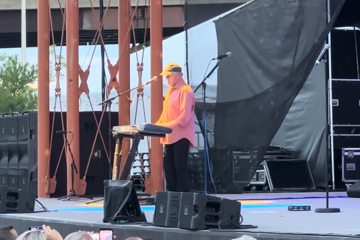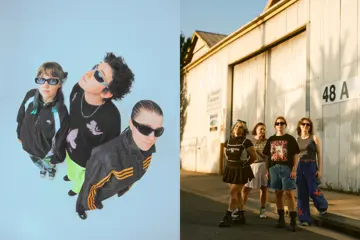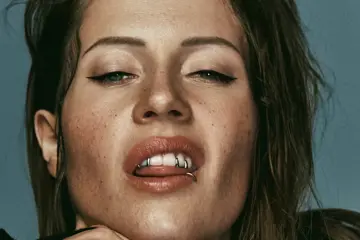MEN IN BLACK: INTERNATIONAL
★★
Here come the Men In Black. Big Willie Styles once claimed that said Men “won’t let you remember”, but Men In Black: International just hopes you haven’t forgotten. That 1997 original — insidiously-catchy theme-song notwithstanding — happened over two decades ago. Men In Black II came out in 2002, back in a time so distant it featured a Michael Jackson cameo. Even 2012’s time-travelling legacyquel Men In Black 3 came out long enough ago that it opened before the first Andrew Garfield Spider-Man.
Here, there’s a whole new set of stars dressed in Reservoir Dogs suits, tasked with maintaining relationships with alternately wacky or evil alien beings. Chris Hemsworth and Tessa Thompson, having already shared the screen in Thor: Ragnarok and Avengers: Endgame, again are set against each other, with comic banter and sexual tension their proscribed screenwritten clichés. He’s arrogant, reckless, and emotional; she’s calculating, cold, and logical. They’re the Original Odd Couple!
They head out on a pretty standard globetrotting mission — there’s a mole within MIB, they have to go rogue, they’re chasing a veritable MacGuffin from set-piece to set-piece — which touches down in New York, London, Paris, Marrakesh, and some fanciful Italian isle. As zany aliens try hard to gin up a laugh (Kumail Nanjiani’s tiny jokester ‘Pawny’ is a shameless, artless avatar of comic-relief), Hemsworth and Thompson try to make this lead balloon float via the buoyancy of their moviestar charisma.
Yet, their supposed comic banter fails to land, sexual tension fails to spark, and Hemsworth’s normally great comedic timing seems weirdly AWOL. Unless someone’s a Will-Smith-original-trilogy truther, I can’t imagine audiences getting too mad about this latest iteration of a B-movie franchise. It’s an inoffensive-enough film, a motion-picture product peddling 115 minutes of time-killing content to be consumed by people on international flights.
Don't miss a beat with our FREE daily newsletter
But Men In Black: International features not a single memorable piece of photography, montage, screenwriting, or even fan-servicing brand-management. In fact, I’m hard-pressed to remember much of anything about the film at all; which seems all too fitting given the franchise’s great contribution to the collective consciousness is the memory-wiping neuralyzer. This Men In Black won’t let me remember, but only because it’s all too forgettable.
X-MEN: DARK PHOENIX
★1/2
“I’ve been thinking,” says Jennifer Lawrence, in the first act of X-Men: Dark Phoenix, “maybe it’s time to move on.” And how. As Fox’s iteration of the X-Men franchise comes to an end after 12 movies, it feels like a series, an audience, and a host of contractually-obligated stars being put out of their misery. And Lawrence is the ultimate barometer of this, her four X-Men turns increasingly having the air of disinterested cheque-cashing, the clash between a star’s growing power and a studio’s contractual demands playing out in the ever-diminishing amount of patiently/painfully-applied latex Lawrence sported. By Dark Phoenix, feeling that need to move on, she’s essentially just in a slapdash layer of blue face-paint; cue the Tobias Fünke jokes.
It’s not the only time someone intones something telling about taking another lap around the X-Men block. “You’re always sorry, Charles, and there’s always a speech,” offers Michael Fassbender. “No one cares anymore.” It’s not quite as good a diss as when Deadpool pronounced the X-Men “a dated metaphor for racism in the ’60s”, but it’ll do.
Here, it’s not the 1960s, but, apparently, 1992. After past franchise instalments deliberately delivered dated kitsch, pop-cultural references, and oldies-radio soundtrack cues from the ’60s (First Class), ’70s (Days Of Future Past), and ’80s (the horrifyingly-bad Apocalypse), here there’s no grunge rock needle drops or video-stores or Simpsons t-shirts. Having evidently been scooped on such shenanigans by Captain Marvel, this film finds the X-Men series ditching its own gimmick, there not a single pop-cultural, political, or technological reference to the period, just a lonely year-stating intertitle early in the piece.
Were there some Doc Martens or Barcelona Olympics news reports, maybe you’d be momentarily distracted from how colossally shitty Dark Phoenix is. Here, Sansa Stark becomes “the greatest force in the galaxy” — yeah, the same Jean Grey storyline as previously seen in The Last Stand — which serves as grand parable for both repressed trauma and adolescent rage, but really just means that there’s copious scenes of CGI explosions and objects blasted about the frame. There’s no fun to be had, no jokes, no directorial élan, no emotional engagement. It’s a laborious chore, as tedious as a movie about superpowered mutants could be.
For a franchise that’s been rebooted and retconned, been piloted by Bryan Singer and Bret Ratner, delayed the release of Dark Phoenix and the still-imminent New Mutants for years, and featured an astonishing number of scenes where Michael Fassbender holds out his hands and pulls gurning faces whilst pixels whoosh around him, an ending this bad is a fitting finale.
Sure, Deadpool and Logan were great, but part of the reason why people loved them is that they ran contrary to the main franchise/team-up movies of the X-Men-verse, which have been bloated and stupid, tonally inconsistent from film to film. Filling the background with pulled-from-the-comics characters we were never introduced to nor cared about and the foreground with whichever actors became most famous outside of the series, they were artless riffs on an allegory — mutants as symbolic others — that could easily be use as political-parable for any era. The only thing the main movies shared in common was impossibly-inflated stakes. Here, the fate of all creation hangs in the balance, only the actors involved seem like they couldn’t give less of a shit.
In such, there’s what’s either unintentionally-hilarious or a sly piece of franchise-overseeing in-jokery happening in the third act. Our troop — our family — of mutants have been captured by angry humans, and are being sent to an internment facility. They’re shackled up, going nowhere; as locked up as these actors have been in their sequel-demanding contracts. And with Fox handing over control of X-Men ‘property’ to our overlords at Disney, it’s telling that shepherding them on their way to their sad fate are soldiers from the Mutant Containment Unit, aka the MCU.
Eventually, they escape from these chains, there’s lots of explosions, and, then, a host of twee endings come, characters’ fates tied up in a neat little packages. No, these X-Men alumni don’t have to head to the inevitable new Marvel Studios re-do, where hope remains that there’ll be better filmmaking awaiting these beloved comic-book characters.
Instead, Blue Man J-Law and phoning-it-in Fass and Tye Sheridan’s boring-as-all-shit Cyclops shall remain eternal symbols of how awful this series was, memories of a future-past that already seems terribly dated.



